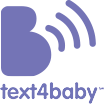Resources for New Moms
- Baby’s Development
- Tips & Resources
- Feeding Baby
- Health & Safety
- Well-Child Visits & Vaccines
- Well-Child Visit Guides
- Vaccines
- Finding Free Vaccines
- Making Shots Less Stressful
- Protect Baby from Pertussis (Whooping Cough)
- Vaccine Information for Babies
- Vaccines: DTaP
- Vaccines: MMRV
- Vaccines: Hepatitis A
- Vaccines: Hepatitis B
- Vaccines: Hib
- Vaccines: Rotavirus
- Vaccines: PCV
- Vaccines: Polio (IPV)
- Vaccines: Seasonal Flu
- Vaccines: Varicella
- Parenting
Preventing Tooth Decay
Q:
Is it okay to clean my baby's pacifier that dropped on the floor by putting it in my mouth?
No
Correct!
If you put your baby's spoon or pacifier in your mouth and then put it in your baby's mouth, you pass cavity-causing bacteria on to your baby.
Yes
Incorrect!
If you put your baby's spoon or pacifier in your mouth and then put it in your baby's mouth, you pass cavity-causing bacteria on to your baby.
Keep baby’s gums and teeth clean
Begin cleaning your baby’s mouth during the first few days after birth. After every feeding, wipe your baby’s gums with a clean gauze pad. This removes plaque, and helps your baby become used to having her gums and teeth cleaned – and it will make tooth brushing easier. When teeth begin to break through the gums, brush them gently with a child-sized toothbrush and water.
Baby tooth decay
Your child’s baby teeth are at risk for decay as soon as they show up – usually around age 6 months.
Tooth decay begins when cavity-causing bacteria is passed to an infant. For example, if you put your baby’s spoon or pacifier in your mouth and then put it in your baby’s mouth, you pass cavity-causing bacteria on to the baby.
Another cause of tooth decay in babies is frequent or long exposure to liquids that contain sugar, such as fruit juices or sweetened liquids.
Tooth decay in infants and toddlers usually occurs in the upper front teeth, but it can also occur in other teeth. In some cases, infants and toddlers have experienced decay so severe that the teeth cannot be saved and need to be removed. The good news – decay is mostly preventable.
To bed without a bottle
It’s important to put your baby to bed WITHOUT a bottle to avoid tooth decay. Sugary liquids from a bottle, like breast milk and formula, pool around the teeth while your baby sleeps and bacteria in the mouth uses these sugars as food. They then produce acids that attack the teeth. Each time your child drinks a liquid with sugar, acids attack their teeth for 20 or more minutes. These acid attacks cause the teeth to decay.
Pacifiers dipped in sugar, honey or sweetened liquids can also lead to tooth decay since the sugar or honey can provide food for the bacteria’s acid attacks.
What happens if baby teeth get cavities?
If a baby tooth is lost too early, the permanent tooth beside it may drift into the empty space. When it’s time for the other permanent teeth to come in, there may not be enough room. This can make the teeth crooked or crowded. Starting your babies off with good oral care can help protect their teeth for life.

